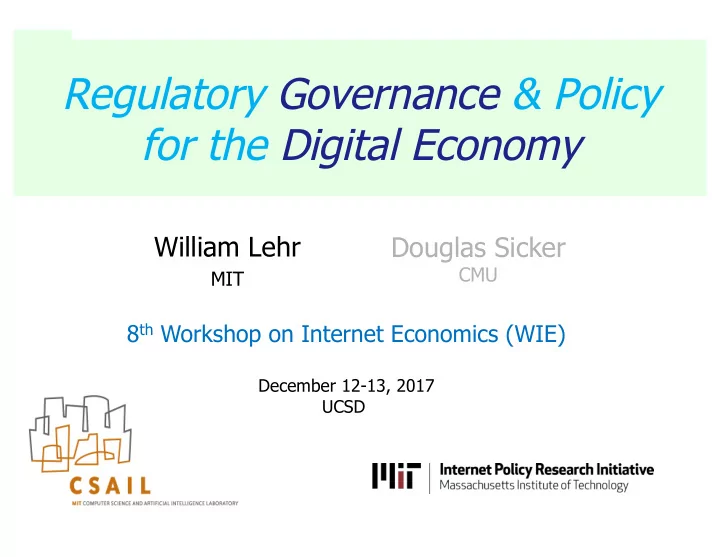

Regulatory Governance & Policy for the Digital Economy William Lehr Douglas Sicker CMU MIT 8 th Workshop on Internet Economics (WIE) December 12-13, 2017 UCSD
Prior papers… 1. Lehr, W. and D. Sicker (2017a), “Would you like your Internet with or without Video,” Journal of Law, Technology & Policy, vol 2017 (issue 1 Spring) Problem may be Entertainment eating Internet 2. Lehr, W. and D. Sicker (2017b), “Communications Act 2021,” TPRC45, forthcoming Journal of High Technology Law, 2018. Agenda Setting: what we need Communication Regulation to do 3. Lehr, W., D. Clark, and S. Bauer (2013), "Measuring Performance when Broadband is the New PSTN," Journal of Information Policy, Vol. 3 (2013), pg. 411-441 Legacy regulation is big impediment to future policy 2
Communications Policy Scope for communications policy? • • Can’t be everything, but BB/Internet impacts everything. • Role for National (independent, sector-specific) regulator? Broadband & Internet related, but distinct • • BB platform for lots of services • Internet is e2e: ISPs, Edge providers (GANFAM…) What are (some of) the questions? • • Prioritized policy agenda? CommAct2021 • Is new CommAct2021 a dream? Probably yes, but maybe not.. • What’s most important focus in near term? Transparency • (How much of this is result of Entertainment eating Internet?) 3
Broadband Platform (1) Last-mile bottlenecks • • Reduce entry barriers to facilities-based competition: spectrum, empower edge-based alternatives (muni networks), access to ROW/conduit/pole-attachments, etc. • Regulate shared access to any true bottlenecks (and last-mile may not be only bottleneck…) (2) BIAS not the only service using platform • • What to regulate? Mischief and spillovers enduring problem. Cross- subsidization w/ shared resource always messy. • OTT is substitute and complement (3) Broadband platform continues to evolve • • Mobile-fixed convergence • Video (CDNs) • Clouds (where should functionality live?) 4
Internet: what is bad behavior on e2e? Internet regulation (if at all) has to be market-based…. • (1) ISPs not only players with market power – GANFAM • • Interconnection a market negotiation? • What are problems? • Congestion? (who should solve?) • Abuse of market power? • Mislead or misinform market: consumers? Edge providers? • Lack of level playing field? (is regulation needed to level field?) • (Coordination: interoperability? Connectivity?) (2) What is good behavior? (ISPs not only potential villains..) • • Search/Routing: where is e2e? ”find X” or “get me to IP add X.X.X” • Traffic management/Pricing? 2 sides of same coin • Consumer choice? informed behavior or alternatives choices? (3) What to do about it? • • Regulatory reform: authority to regulate bad actors (not just ISPs) • Transparency… 5
Transparency Who needs to know what? • • Consumers: Truth in Advertising… (do they actually read anything…) • Edge providers: What do they need to provision alternatives ?? • Regulators: case-by-case w/ confidential disclosure…if have capacity How should we learn? • • Measurement by 3rd parties: CAIDA et al. è need platforms • Disclosure: mandatory What information disclosed by ISPs would be most helpful? • What about ”cloud” providers? (GANFAM, “darkening” Net?) • Capacity • Traffic flows • Contract terms (Business practices) 6
OTHER STUFF…. 7
Digital Economy transformation disrupting everything Sector ICT driven changes Challenge Media Streaming, a la carte Entertainment eats the world. Fake news. Banking ePay, crypto-currency Financial market stability. Energy Smart grids Climate change, shift renewables Services Sharing economy (Uber, Regulatory reform - Employment, AirBnB, etc.) Consumer protection, Sector specific rules Fiscal Footloose asset ownership Eroding tax base Etcetera … Communications Policy? critical Digital Economy Infrastructure, new “PSTN” Communications Policy is the plumbing policy for a world where • Information Policy is what’s most important Refocused à Broadband Platform & (Open) Internet • Light-handed, market-based (adaptive, dynamic, multi-stakeholder) • 8
Proposal for a new… 9
Entertainment/Smart-X Economic Convergence Entertainment: ~5% consumer expenditures; leisure time limited • Smart-X: energy grids, infrastructure (cities, roads), healthcare, etc. • Entertainment Smart-X Function Entertain Communicate, Control Key Feature Differentiate Interoperate Quality of Experience Connectivity Demand Leisure $'s/Attention Management Economics Macro Distribution Growth Micro Windowing, IPR Min. requirements Market segmentation Reduce costs, enhance capability Pricing/Capabilities? Entertainment: distribution channel bundling/discrimination key • Smart-X: reliability, security, privacy, & cost key • 10
Recommend
More recommend